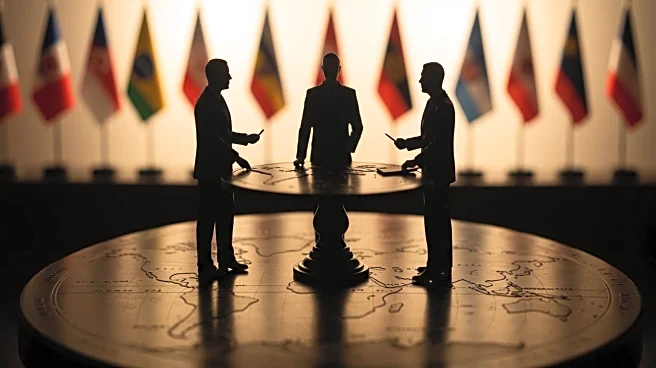What is the story about?
What's Happening?
Ahead of the US-Russia summit, European and Ukrainian leaders are seeking discussions with President Trump to safeguard their security interests. Ukrainian President Volodymyr Zelenskyy has been excluded from the summit, raising concerns about potential agreements between President Trump and President Putin that could involve territorial swaps unfavorable to Ukraine. German Chancellor Friedrich Merz has organized meetings to explore options for pressuring Russia and preparing for peace negotiations. The European Commission and several European leaders are set to participate in these discussions, emphasizing the need for Ukraine's involvement in any decisions regarding its territory.
Why It's Important?
The exclusion of Ukraine and European leaders from the summit discussions poses a risk to their security interests and the integrity of Ukraine's borders. The potential for land swaps without Ukraine's participation could undermine its sovereignty and set a precedent for altering international borders by force. The European leaders' efforts to engage with President Trump highlight the importance of maintaining a united front against Russian aggression and ensuring that any peace agreements are made with Ukraine's consent. The summit's outcome could have significant implications for the geopolitical balance in Europe and the future of U.S.-EU relations.
What's Next?
The summit is scheduled to take place in Alaska, and European leaders are expected to continue their efforts to engage with President Trump and advocate for their interests. Chancellor Merz's meetings aim to coordinate strategies for pressuring Russia and ensuring Ukraine's involvement in any territorial agreements. The discussions will focus on security guarantees and the future of Ukraine's sovereignty. The outcome of the summit will likely influence the international response to Russian actions in Ukraine and shape the future of diplomatic relations between the U.S., Russia, and the EU.
Beyond the Headlines
The summit represents a critical moment for transatlantic relations, as President Trump's approach to Russia has raised concerns among European allies. The potential for territorial concessions without EU involvement could lead to a split in the alliance and weaken collective security efforts. The EU's appeal highlights the broader implications of the summit for international law and the principle of non-aggression. The discussions may also influence the EU's future role in global security and its ability to assert its interests in diplomatic negotiations.















